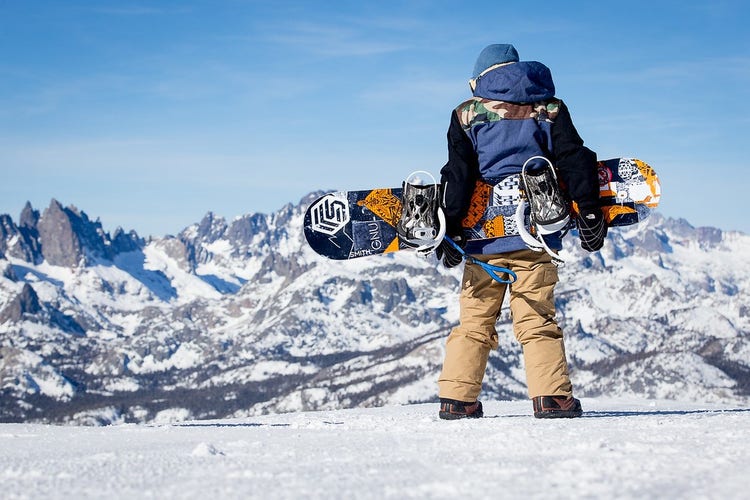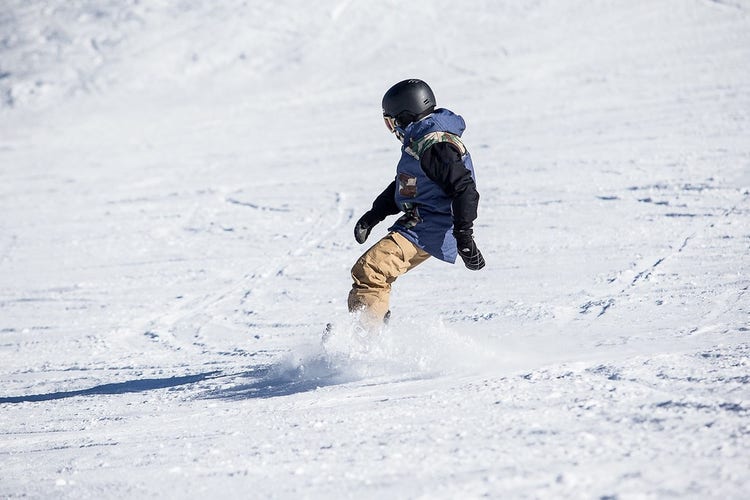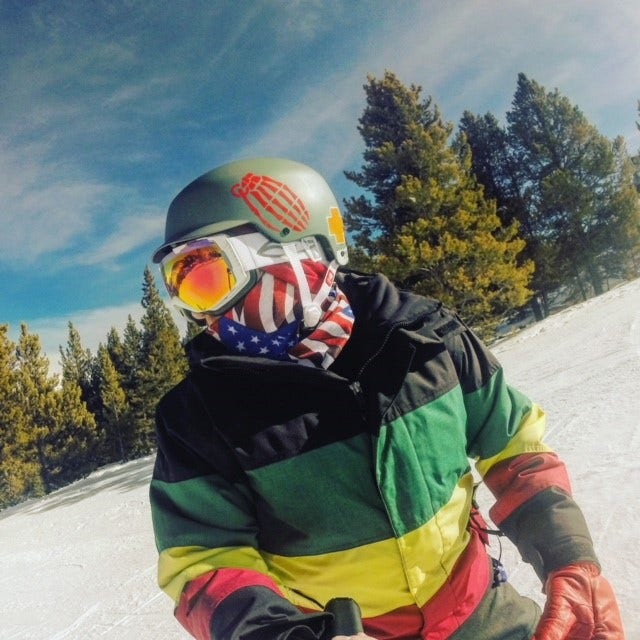Amputee Snowboarder Brett Botelho Is Chasing His Shot at the Paralympics No Matter the Cost

Growing up, Brett Botelho’s brother was an avid snowboarder and an influential part of Botelho’s life.
“I was drawn to the sport. Every time my brother would come home, we would talk about snowboarding,” Botelho says. “We’d watch videos, play snowboarding video games. I always had it in the back of my head that one day, I was going to be able to snowboard with him.”
At age 7, the Southern California native had started experiencing pain in his hip when he walked, and he found himself falling frequently.
Botelho’s parents had taken him to see an orthopedic surgeon and discovered that he was losing blood supply to his right hip joint. Botelho underwent surgery to reattach the blood supply and was put in a body cast for three months.
From there, Botelho experienced a domino effect of health problems. At age 9, he was diagnosed with a neurological condition causing his immune system to attack his nervous system, leaving him paralyzed for two years. The medications he was placed on coupled with the lack of movement left Botelho 100 pounds heavier and feeling stuck in his own skin, unable to do any of the things he wanted to.
It was during this time that Botelho’s brother would return from snowboarding and recount his experiences. Botelho knew that if he ever wanted to get on the mountain, he had to learn to stand and walk again. “I made the decision to start piecing my body back together,” Botelho says. “I knew that each surgery was going to be difficult but [that] it was going to make a better version of me. It was going to put me in a better position in the long run.”
Multiple ankle surgeries on each foot took him through high school and college. The surgeries would work for a few months, Botelho recalls, and then his ankles would become weak and they’d have to do yet another surgery. Between surgeries, he wore large, hard, uncomfortable braces in order to walk, snowboard and have a “normal” life. Eventually, Botelho knew that he couldn’t continue living his life in braces.
Botelho asked his doctor for options. “He began telling me about this surgery where he would put a rod down my leg and bolt this and do that, and I literally stopped him and said, ‘What if we just amputate my leg?’” Botelho recalls. His doctor agreed, and in December 2014, Botehlo’s left leg was amputated below the knee.
Pressing play on life

After his amputation, Botelho says, his passion for snowboarding exploded. Within two months after his surgery, he was back on the mountain.
“My whole life had been on pause,” he says. “When I had this amputation, I felt like I had pressed play on my life. I knew I didn’t really have to worry about pain. I get up, I put the leg on—which takes me less than two minutes—and I can say ‘What am I going to do today?’ rather than ‘How am I going to get through this day?’ My whole perspective changed.”
During his recovery from his amputation surgery, Botelho had read double-amputee Amy Purdy’s book. In the book, Purdy wrote about Adaptive Action Sports, the company she and her husband started in Colorado in 2005. AAS provides action sports programs for disabled youth, young adults and veterans—with a specific focus on snowboarding.
Botelho reached out to AAS on social media asking how he could get involved. They invited him out to Colorado for a visit, and after spending a few days there, Botelho knew that Colorado was where he belonged. The next few seasons, Botelho spent time in Colorado with AAS, training and getting stronger.
Last summer, Botelho became a member at 24 Hour Fitness Palmdale West Active in Southern California, and he started training with a personal trainer, Virginia, to prepare himself for his more permanent return to Colorado in the winter to begin training for the U.S. Paralympic snowboard team.
“Virginia is one of the most amazing people I’ve ever met,” Botelho says. “Her passion for what she does is nothing short of amazing. She just kept pushing me, and we worked together the whole summer on my strength and getting me stronger. I knew that my snowboarding skills were there. I just needed to be physically stronger.”
Against all odds

A year and a half ago, Botelho was diagnosed with an autoimmune disorder. His autoimmune system attacks his red blood cells, leaving him with half the amount of blood in his body as a healthy human being. It was just after this diagnosis that Botelho found himself with the time to pursue another dream, one that had been in the back of his mind for years: putting his story down on paper.
Botelho found a publisher and got to work writing his story. His book, “Standing My Own Ground” (WIPublish), was released in October 2017. Since then, Botelho has gone all over the country, speaking to groups about what it means to pursue a dream against all odds.
This year, Botelho moved to Colorado full time to live and breathe snowboarding. Because of his autoimmune disorder and the high volume of training, Botelho has to get blood transfusions every few weeks.
“It makes things that much more difficult, especially living at 9,100 feet and trying to compete,” Botelho says. “But I have my dreams, and I kind of weigh the reward and risk factor and I just go.”
His health issues haven’t ended there. Recently, Botelho had hip surgery to replace the seven stainless-steel cables in his hip that snapped because of wear and tear from snowboarding and working out. Despite this small setback, Botelho is excited to get back into training. He is a huge believer in the power of visualization.
“I visualize one to two hours a day: what needs to be done, how I’m going do it, what it’s going to look like in the future, how I’m going to get there,” he says. “I started that with my amputation and it really helped me. I visualize everything I need to do to get back on that mountain in the quickest time.”
For Botelho, nothing is more important than pursing his dream of making the U.S. Paralympic snowboard team. All his free time is spent training. He rarely watches TV or sits around because he knows that as long as he has the physical ability to do something, he should be.
“Now is the time to live and take advantage of every moment. I don’t know if I’m going to be healthy in a week or a month, but I know I feel good today, so that’s why I’m in the gym or on the mountain. I’m going to take advantage of the moment when I can. I have an opportunity to do this, to enjoy my life and live it to the fullest. Do I want to wait until it seems more realistic, or do I just want to do it now and figure things out later?” Botelho says, laughing. “I want to do what gives me purpose rather than just sitting here and waiting for something to go wrong.”
Photo credit: Courtesy of Brett Botelho